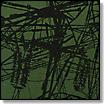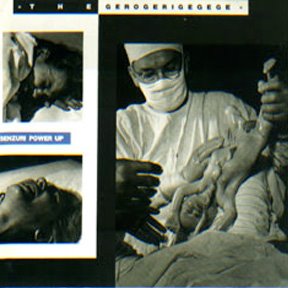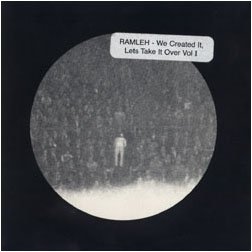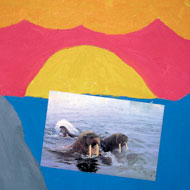RETRO NOISE MONTHLY (JUNE EDITION)
RST - Warm Planes
(Corpus Hermeticum, 2000)

New Zealander Andrew Moon played drums in the pretty great Goblin Mix, but his solo guitar stuff as RST was his peak acheivement and this disc of heavy, subtle drones is probably his best (haven't heard 'em all, but it at least beats the very good R136a on Ecstatic Peace). I don't recall this being quite so gripping when it came out - I guess it had a lot of HermesCorp competition - but most of the drones here are suprisingly weighty, despite an odd calmness that's cleverly deceptive. In other words, the surface here is vaguely placid, but right below is a stomach-churning din waiting to pull any patient listener in, sorta like quicksand topped with sugar. There's also a weird sheen of mild crackle bubbling beneath, as if Moon has dipped his drones in water and then waved them near a wall socket. One track is even called "Voltage (Dub)," and there's definitely an otherwordly static electricity covering Warm Planes' dense, bassy meditiations. As I was saying last week, the best drones tend to slice open your middle immediately, but the strange beauty of RST's is that they take a while - or maybe they just come with their own anaesthetic, cause by the time you notice that Andrew Moon has scalpeled through to your insides, he's already closing up your sutures.
THE GEROGERIGEGEGE - Senzuri Power Up (Un-Released Studio Track 1985/1986)
(Vis a Vis Audio Arts, 1991)
 I always thought of Juntaro Yamanouchi's Gerogerigegege as a living embodiment of the more scatological Boredoms song titles, and revisiting this rec of outtakes doesn't change my mind, though I am suprised at how great it still sounds. (For the uninitiated, this highly entertaining Wikipedia entry tells you everything you need to know, though I can't resist reprinting this wonderful section):
I always thought of Juntaro Yamanouchi's Gerogerigegege as a living embodiment of the more scatological Boredoms song titles, and revisiting this rec of outtakes doesn't change my mind, though I am suprised at how great it still sounds. (For the uninitiated, this highly entertaining Wikipedia entry tells you everything you need to know, though I can't resist reprinting this wonderful section):The name of the group combines the Japanese words for "vomit" (gero) and "diarrhea" (geri) with what is supposedly the sound of these actions occurring simultaneously (gegege). (It has also been transliterated to mean "barf, diarrhea, ha ha ha," although "ge" is also variously an onomatopoetic word of disgust or exasperation, making the name open to several differing interpretations.) To describe the group, Yamanouchi has used the term "Japanese Ultra Shit Band."
Anyway...the Gerogerigegege actually released some rock and even ambient stuff at points (I guess their classic is Tokyo Anal Dynamite), but noise was their, uh, "strength," and Senzuri Power Up is 24 minutes of organ-distending proof. It opens with some sample of big-band Japanese pop, but that quickly gets obliterated by a giant guitar-rape mixed with a throat-searing howl and trashaholic drums, and from there the intestinal blast-laffs never stop. (They even make a sound that lives up to the title "I Wanna Be Your Pantie.") I had no idea how much Sightings kinda sounds like this, and I wouldn't be surprised if M.Morgan & co. dig these guys, but the similarity is far from plagiary - instead think of the Gerogerigegege as the mentally-challenged older brother that still lives in the attic of Sightings' parents. Or just think of them as a head-flattening, bowel-reducing aural virus that Senzuri Power Up somehow managed to trap inside a rancid petri dish.
RAMLEH - We Created It, Let's Take It Over, Vol. I
(Pure, 1995)

Ramleh, the Brit duo of Gary Mundy and Philip Best, were a little brother band to Skullflower, in a way I'm not sure I know/care to know. Regardless, they took the more hyper sides of that larger group and strained them through a penchant for lung-killing screech, abrasive jolts, and semi-punk/metal song titles. Where Skullflower often built up their noises and drones in a gradually, kinda crafty manner, Ramleh went straight for the veins, with mixed but mostly devastating results. We Created It... is a three volume Pure set of early (mostly cassette) detritus, and I'm betting I have the other two editions, but I'm betting even more strongly that I'll never find them.
It's probably just the proximity that makes me think this, but We Created It... actually falls between RST and the Gerogerigegege - it's more solid and less hyper than the latter, building solid columns of noise not unlike RST's sandy drones, but there's enough desperate yelling to put Ramleh in the same genus (maybe even phylum) as Japan's Ultra Shit Band. I'm trying to dredge up other reference points, but they're eluding me right now, which might mean that Ramleh's combo of string-slicing noise-scapes and harrowing-yet-sorta-musical shrieking is actually somewhat unique. Not what I expected to conclude, but check out the self-titled track linked below: it seems to sounds like somebody, but let's see you name them, cause I can't. I keep waiting for a record in one of these retro entries to fall short, and Ramleh seemed like the best candidate so far, but sorry - We Created It... is a sweet stink-bomb of olfactory noise worth at least 40 minutes of alone time.
mp3s:
THE GEROGERIGEGEGE - "Anal Beethoven #2" from Senzuri Power-Up
RAMLEH - "Ramleh" from We Created It, Let's Take it Over Vol. I





